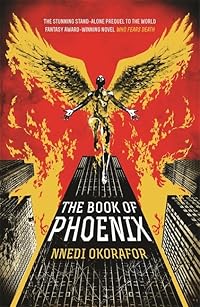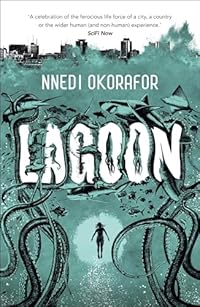Binti: The Night Masquerade by Nnedi Okorafor
Posted in Fantasy, Reading Reviewed, Science Fiction at 12:00 on 12 October 2021
Tor.com, 2018, 228 p.

When a first person narrator (here the titular Binti) dies halfway through the text it presents something of a problem for the author. How do you carry on? How can the story not finish then and there? Okorafor’s solution here is to switch to third person – at least till the end of the chapter, when Binti comes alive again, (with a bit of authorial hand-waving. Microbes, she is told by her alien companion Okwu, “blended with your genes and repaired you,” in a breathing chamber in a young spaceship called New Fish.) I would submit that this aspect of the book (though there are others too) makes it more of a Fantasy than Science Fiction. Or is that just me being purist? Still, it makes for an interesting read.
Once more (see here for my previous experience of this scenario) her ever dwindling supply of the skin-covering paste called otjize is a constant source of concern for Binti, without it she feels naked and again she makes extensive use of her edan. Her Meduse okuoko (blue tentacles on her head instead of hair) mark her out, though.
There is still a war going on between humans called the Khoush and the alien Meduse. Binti has moved on from Oomza Uni, the first of her Himba people to go there, the first to leave Earth. Now part Meduse, she has an affinity with and ability to use mathematics, calling up currents to “tree”. When stressed she repeats the word “five” to calm herself. She also has a connection to the Enyi Zinariya, twenty-foot-tall slender beings who seemed to be made of molten gold. Accompanied by Mwinyi, a zinariya, she is going back to her homeland to try to broker a peace between the Khoush and the Meduse. Her family produced astrolabes, devices which carry the full record of your entire life. Hers and her father’s were the best in the business. In times of crisis Himba turn inward. Her family did so (into the Root where they lived) when their village was threatened by the Khoush and their Root was burned so Binti thinks they are all dead.
In the run up to the peace meeting she sees once again The Night Masquerade, a spirit previously only appearing to males (but which we later find is not a spirit,) thereby confirming her unique status. During the negotiations something goes wrong (a minion on one side did not like the prospect and opened fire) and Binti gets shot. Her body is taken on board the New Fish and taken to the rings of Saturn about which she had had a premonition. She reflects, “It was so unlike Earth, where wars were fought over and because of differences and most couldn’t relate to anyone unless they were similar.”
It all makes sense in context and Binti is an engaging companion. It is also still refreshing to read SF from beyond the familiar Anglophile template.
Pedant’s corner:- “Time interval later” ~(or equivalent) count, 8. Otherwise; zinairya (elsewhere zinariya,) spit (spat,) sunk (several times; sank,) shrunk (shrank.) “Astrolabes were the only object that… (objects,) shined (several times; shone.) “None around me were beathing” (was breathing,) “the feel of the numbers … were such a relief” (the feel … was such a relief.) “I didn’t want to go with.” (I didn’t want to go with him,) accidently (accidentally,) a missing quote mark at the end of a piece of direct speech, “their skin and hair was nearly free of otjize” (were nearly free,) “presented the dress she’s sewn for” (the rest of the sentence was in past tense, ‘she’d sewn’,) “the Roots defenses” (Root’s, [defences],) “off of” (just ‘off’,) “as Mwinyi and Okwu moved went New Fish’s walkway” (I have no idea why that ‘went’ is there. The ‘moved’ is a bit iffy too,) “the far side of the doom” (dome,) two full stops at the end of one sentence.



